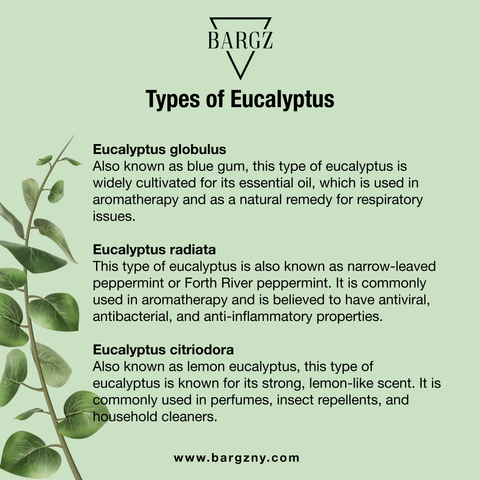Are you looking for a versatile and beneficial plant to add to your garden? Look no further than eucalyptus! This unique tree, native to Australia but now cultivated in many parts of the world, is known for its distinct, refreshing scent and many health and household benefits.
From its medicinal properties to its aromatherapy benefits and even its usefulness in household products, eucalyptus is truly a multi-purpose plant. In this article, we'll explore the various types of eucalyptus and their benefits and provide growing tips to help you successfully cultivate this amazing plant in your own backyard.
So, whether you're a seasoned gardener or just starting, read on to learn everything you need to know about eucalyptus!
Eucalyptus
Eucalyptus is a type of tree that belongs to the Myrtaceae family that can be taken as the famous Eucalyptus essential oil. It is native to Australia but is now cultivated in many other parts of the world, including South Africa, Portugal, Spain, and the United States. Eucalyptus is known for its distinct, refreshing scent and many health and household benefits. This article will discuss the types of eucalyptus, its benefits, and growing tips.
Types of Eucalyptus
Eucalyptus is a diverse plant with over 700 species, but some are more commonly used than others. In this section, we will discuss the three most commonly used types of eucalyptus and their unique characteristics. The most commonly used types are:
Eucalyptus globulus
Also known as blue gum, this type of eucalyptus is widely cultivated for its essential oil, which is used in aromatherapy and as a natural remedy for respiratory issues.
Eucalyptus radiata
This type of eucalyptus is also known as narrow-leaved peppermint or Forth River peppermint. It is commonly used in aromatherapy and is believed to have antiviral, antibacterial, and anti-inflammatory properties.
Eucalyptus citriodora
Also known as lemon eucalyptus, this type of eucalyptus is known for its strong, lemon-like scent. It is commonly used in perfumes, insect repellents, and household cleaners.

Benefits of Eucalyptus
Eucalyptus is a popular and versatile plant known for its many health and household benefits. From its medicinal properties to its aromatic scent, eucalyptus has been used for centuries for its therapeutic effects.
Medicinal benefits
Eucalyptus has been used for centuries as a natural remedy for various health issues. Its essential oil is known for its antiseptic, anti-inflammatory, and decongestant properties. Eucalyptus oil can be used to relieve respiratory issues such as coughs, colds, and asthma. It is also believed to have analgesic properties and can be used to relieve pain.
Aromatherapy benefits
What does eucalyptus smell like? Eucalyptus essential oil is commonly used in aromatherapy for its refreshing and stimulating properties. It can help relieve mental exhaustion and boost energy levels. It is also believed to have a calming effect on the mind and can help reduce stress and anxiety.
Household benefits
Eucalyptus leaves, and essential oil can be used in many household products, such as cleaning solutions, air fresheners, and insect repellents. Eucalyptus leaves can also be used to repel insects naturally.
Growing Eucalyptus
Eucalyptus is a fast-growing tree that requires a warm and sunny climate. It is relatively easy to grow and can be propagated from seeds or cuttings.
Climate requirements
Eucalyptus requires a warm and sunny climate to grow. It is best suited for USDA zones 8-11. It can also tolerate a wide range of soil types, including sandy.
Soil requirements
Eucalyptus trees prefer well-draining soils and can grow in various soil types, including sandy, loamy, and clay soils. The soil pH should be between 6.0 and 7.5. If the soil is too acidic, add lime to raise the pH.
Propagation methods
Eucalyptus can be propagated from seeds or cuttings. If you are propagating from seeds, you can start the seeds indoors in late winter or early spring. Once the seedlings are a few inches tall, you can transplant them to larger pots or directly into the ground.
If you are propagating from cuttings, take a cutting from a mature eucalyptus tree in the summer. Dip the cutting in the rooting hormone and plant it in well-draining soil. Keep the soil moist and provide the cutting with bright, indirect light.
Maintenance tips
Eucalyptus trees require regular maintenance to ensure healthy growth. Here are some tips for maintaining your eucalyptus tree:
- Water the tree regularly, especially during dry spells.
- Mulch around the tree's base to retain moisture and prevent weed growth.
- Fertilize the tree once a year with a slow-release fertilizer.
- Prune the tree in late winter or early spring to remove dead or damaged branches and promote new growth.
Harvesting Eucalyptus
Harvesting eucalyptus leaves is a simple process that can provide you with an abundance of fragrant leaves for various purposes. Whether you want to use them for aromatherapy, medicinal purposes, or in household products, harvesting eucalyptus leaves is a great way to enjoy the benefits of this versatile plant. Here are more tips:
Best time for harvesting
The best time to harvest eucalyptus leaves is when the leaves are mature and contain the highest concentration of essential oils. The leaves can be harvested year-round, but it is best to harvest them in the summer or fall.
Harvesting methods
Cut the branches from the tree with pruning shears to harvest eucalyptus leaves. Strip the leaves from the branches and discard their branches. You can use the leaves fresh or dry them for later use.
Conclusion
eucalyptus is a truly amazing plant that offers a wide range of benefits for both health and household purposes. Growing and harvesting eucalyptus in your backyard allows you to take advantage of all these versatile plant offers. So, whether you want to use eucalyptus for its medicinal properties, in aromatherapy, or household products, follow the tips outlined in this article to ensure success. And remember to enjoy the refreshing scent of eucalyptus along the way!
Always consult a healthcare professional before using eucalyptus for medicinal purposes.
Recommended Article:



